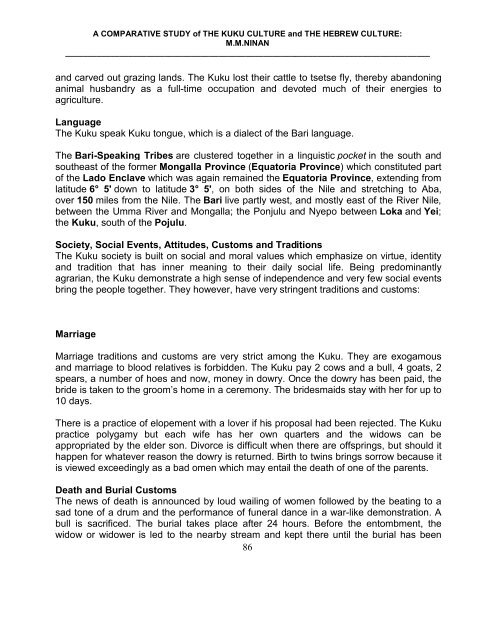kuku and Hebrew culture
Create successful ePaper yourself
Turn your PDF publications into a flip-book with our unique Google optimized e-Paper software.
A COMPARATIVE STUDY of THE KUKU CULTURE <strong>and</strong> THE HEBREW CULTURE:<br />
M.M.NINAN<br />
_________________________________________________________________________________<br />
<strong>and</strong> carved out grazing l<strong>and</strong>s. The Kuku lost their cattle to tsetse fly, thereby ab<strong>and</strong>oning<br />
animal husb<strong>and</strong>ry as a full-time occupation <strong>and</strong> devoted much of their energies to<br />
agri<strong>culture</strong>.<br />
Language<br />
The Kuku speak Kuku tongue, which is a dialect of the Bari language.<br />
The Bari-Speaking Tribes are clustered together in a linguistic pocket in the south <strong>and</strong><br />
southeast of the former Mongalla Province (Equatoria Province) which constituted part<br />
of the Lado Enclave which was again remained the Equatoria Province, extending from<br />
latitude 6° 5' down to latitude 3° 5', on both sides of the Nile <strong>and</strong> stretching to Aba,<br />
over 150 miles from the Nile. The Bari live partly west, <strong>and</strong> mostly east of the River Nile,<br />
between the Umma River <strong>and</strong> Mongalla; the Ponjulu <strong>and</strong> Nyepo between Loka <strong>and</strong> Yei;<br />
the Kuku, south of the Pojulu.<br />
Society, Social Events, Attitudes, Customs <strong>and</strong> Traditions<br />
The Kuku society is built on social <strong>and</strong> moral values which emphasize on virtue, identity<br />
<strong>and</strong> tradition that has inner meaning to their daily social life. Being predominantly<br />
agrarian, the Kuku demonstrate a high sense of independence <strong>and</strong> very few social events<br />
bring the people together. They however, have very stringent traditions <strong>and</strong> customs:<br />
Marriage<br />
Marriage traditions <strong>and</strong> customs are very strict among the Kuku. They are exogamous<br />
<strong>and</strong> marriage to blood relatives is forbidden. The Kuku pay 2 cows <strong>and</strong> a bull, 4 goats, 2<br />
spears, a number of hoes <strong>and</strong> now, money in dowry. Once the dowry has been paid, the<br />
bride is taken to the groom’s home in a ceremony. The bridesmaids stay with her for up to<br />
10 days.<br />
There is a practice of elopement with a lover if his proposal had been rejected. The Kuku<br />
practice polygamy but each wife has her own quarters <strong>and</strong> the widows can be<br />
appropriated by the elder son. Divorce is difficult when there are offsprings, but should it<br />
happen for whatever reason the dowry is returned. Birth to twins brings sorrow because it<br />
is viewed exceedingly as a bad omen which may entail the death of one of the parents.<br />
Death <strong>and</strong> Burial Customs<br />
The news of death is announced by loud wailing of women followed by the beating to a<br />
sad tone of a drum <strong>and</strong> the performance of funeral dance in a war-like demonstration. A<br />
bull is sacrificed. The burial takes place after 24 hours. Before the entombment, the<br />
widow or widower is led to the nearby stream <strong>and</strong> kept there until the burial has been<br />
86


















